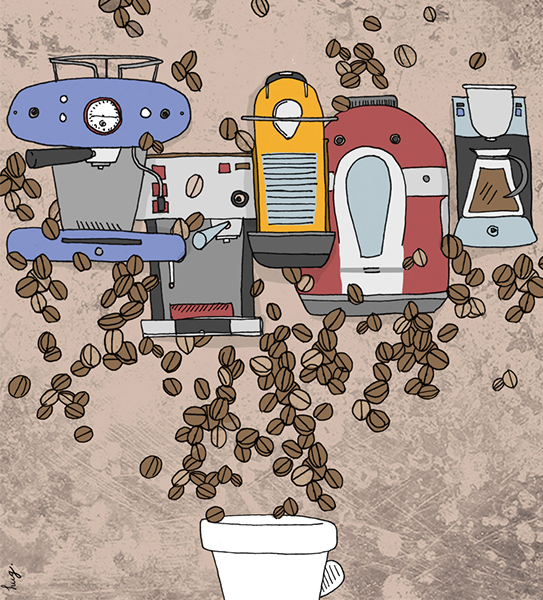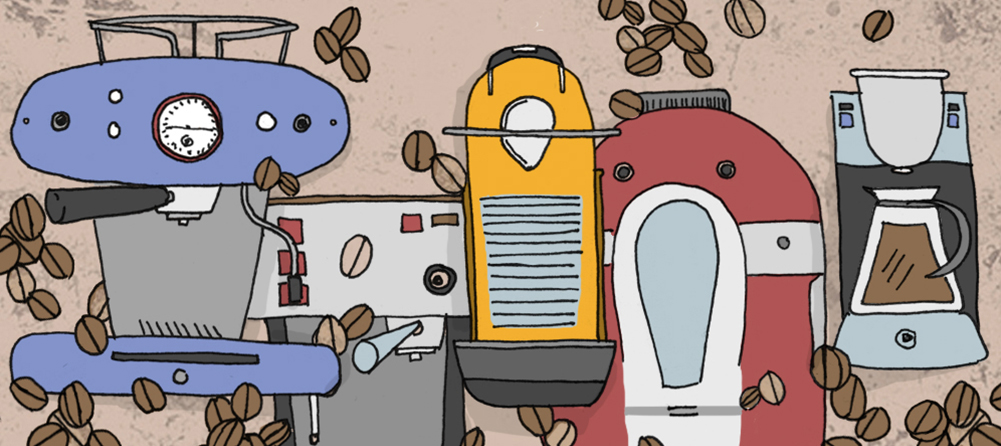When we're asked "What's your poison?" there can only be one response: a long espresso with a bit of froth on top! After many frivolous disagreements over how many capsules we've had to drink that day, we decided to investigate and determine what coffee machine yields the most valuable cup of espresso with the least amount of effort and the fewest coffee granules scattered across the countertop.
Even if we put its acquired yet addictive taste aside, coffee has been proven effective in preventing heart disease and in contributing to work efficiency and concentration. This certainly justifies the urge to treat ourselves to a good espresso machine for the home or the office.
Not that we have a problem with black coffee; on the contrary, it's wonderful. But how can it compete with fresh espresso infused with pressurized hot water topped by an exquisite thin layer of crema? So it begs the question – which machine is worth buying? There are as many answers to this question as there are people you can ask, so we decided to tackle a separate issue: How much does a cup of coffee cost using the different types of machines on the market, and who's suited for each type of machine? As for the company and the model – we've left that for you to decide.
 illustration: Hagar Wertheim
illustration: Hagar Wertheim
Capsules
Machines that work with capsules are the cheapest machines available in the home espresso market, but in essence the coffee itself is expensive.
Opinions are split regarding the quality of the coffee, and there is a relatively high variety of capsules made available by various companies. There are lower quality capsules as well as very high-quality capsules. Plastic capsules are considered inferior because plastic tends to leave a slight aftertaste (here, too, the quality of the plastic matters). Aluminum capsules are considered the best, but they're also the most expensive.
Capsules cost between 1.75-3.30 shekels, but there's more to it than that. You'll need limescale remover that'll set you back a few dozen shekels. The machine needs to be cleaned with the limescale remover every three to four months. In case of malfunction outside the terms of the warranty, the cost for repair is usually low, and if it isn't, it makes sense to replace it with a new machine because it's relatively cheap. On average, capsule machines cost 200-1600 shekels. Of course, there are more expensive machines, but higher prices usually indicate additional machine functions and not necessarily higher quality coffee.

One cup a day for two coffee drinkers brings us to 60 cups a month, which comes to 105 shekels a month when using the cheapest plastic capsule. Aluminum capsules are more expensive and start at 2.20 shekels per capsule, bringing the monthly cost to 132 shekels.
This certainly isn't cheap if you drink two cups a day (each), as it doubles the price to about 264 shekels a month for the cost of the coffee alone.
If you drink your morning coffee at home and you drink your other cups of coffee at work, or if you drink tea as well, this option is certainly worthwhile. If you drink a few cups of coffee at home and when guests arrive you cringe with every capsule they use, it may be best for you to consider other options.
Manual Machines
These machines work similarly to coffee shop machines. The infusion is made by pushing pressurized hot water through a small filter basket that's manually inserted by an attached handle. The amount of coffee used per filter basket is determined by the user.
These machines yield excellent coffee, depending on the quality of the coffee beans, and are relatively cheap. Their attractive design will look beautiful on your countertop, but their disadvantage lies in the way they're operated. There are those who might enjoy the 'ceremony' of making coffee, but if you want a spontaneous cup of coffee during the day, you could find the process a bit pesky.
The coffee container must be emptied out into the waste container, and the scattered coffee grounds need to be cleaned. Also, once the ground coffee is inserted into the machine, it doesn't keep fresh for long.

Still, if you're a quality coffee enthusiast and you drink 2-3 cups a day, this may be the machine for you. At that frequency of use, operating the machine isn't all that tedious, and it's far cheaper than an automatic machine.
The cost of ground coffee in coffee shops starts at 80 shekels a kilo (about 35 shekels a pound), but the supermarket sells 250 gram (9oz) packets for 42 shekels (more or less, depending on the brand). We recommend buying coffee in coffee shops and asking the vendor to grind the beans, or alternately you can buy a coffee grinder to keep at home and buy whole roasted coffee beans.
Coffee can be ground every couple of weeks, so the process isn't particularly cumbersome.
A professional grinder costs 1,000-2,000 shekels, but there are excellent, relatively cheap grinders available for a few hundred shekels. Here, too, the cost of limescale remover must be taken into account, which will cost a few dozen shekels every four months.
What did it all come to? At 80 shekels for a kilo of coffee (35 shekels a pound), and 7 grams (1/4oz) per cup of coffee, this brought the total to 57 agorot per cup (the cost of coffee, which is even cheaper than instant coffee!).
Automatic Machines
These are the most expensive of the bunch, the Rolls Royce of homemade coffee, and their price starts at 2,500 shekels. Their maintenance requires attention, but upkeep isn't expensive, and the cost of pre-ground coffee beans is lower than the cost of coffee needed to operate other machines. The quality of the coffee is up to you and the beans you choose.
How does it work? The machine has two containers, one for the beans and one for water. When you press the button to make an espresso (short, long or double), the machine grinds the exact quantity of beans required to make a cup of coffee and infuses them with the right amount of water for the coffee of your choice. Coffee residue (that comes out shaped like pucks, which in turn is what they're called) is stored inside a waste container that needs to be emptied once it's filled to capacity. By the way, coffee residue is considered organic waste and can also be emptied into the sink garbage disposal. The amount of coffee grains left scattered on the countertop is minimal, and most machine parts are dishwasher-safe.

If you drink a lot of coffee like we do, meaning over four cups of coffee a day, this is probably the most sensible and convenient machine for you.
Disadvantages: its sophistication increases the chance of malfunction and other problems, but newer machines are considered reliable and replacement parts aren't necessarily expensive. On the other hand, cheap, simple machines can break more easily, but they're not always worth fixing due to the cost of the machine. Another disadvantage is the physical size of the machine that occupies valuable countertop real estate, and they are not favored with the sleek industrial design like some of the manual machines.
The price of the coffee is identical to that of manual machines, at about 56 agorot per cup. Additional costs include limescale remover and a limescale filter that add a few dozen shekels to the equation. Four limescale filters and limescale remover will cost 300-400 shekels a year at most, bringing the monthly cost to roughly 25 shekels.
Macchinetta
A few words about the macchinetta: it isn't exactly a machine, and the coffee it produces is in effect mocha and not espresso because the coffee is boiled and not infused. The bottom line is that this old (and photogenic!) machine produces an excellent cup of coffee, with no additional maintenance costs or regular upkeep other than washing it after use.

Like with manual machines, you'll need pre-ground coffee (which can also be prepared with a home coffee grinder), and the cost is identical – 56 agorot per cup of coffee. With no additional expenses for electricity and the cheap price of gas (despite the fact that there are also electric macchinettas) this is the cheapest solution for a cup of 'espresso,' or more precisely, for a cup of mocha.

The bottom line is that for light coffee drinkers, the capsule machines provide an excellent, elegant solution: low machine cost, attractive design, minimal countertop space, and less fiddling about. Once you start taking larger quantities of coffee into account – that's when you should switch to either a manual or automatic machine. The machine pays for itself over time in savings on the cost of the coffee.

